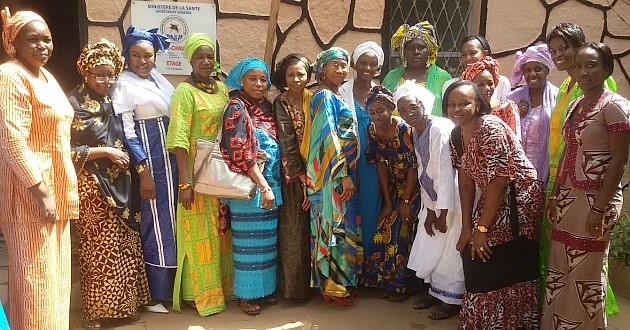Problem
In Mali, women’s participation in science is limited by a host of factors, including difficulties in obtaining funding to pursue doctoral studies, limited opportunities for continuing education, and lack of research skills training. These and other challenges only make it harder for women to balance the demands of career and family.
Proposed solution
The Inter-Agency Network for Research Support for Women (RIARF) was founded to highlight the work of women in health research and to provide professional assistance to women scientists as they embark on their careers.

Background
Located in West Africa, Mali is a landlocked county that shares its northern border with Algeria, its western border with Mauritania and Senegal, its southwestern border with Guinea, its eastern border with Niger, and its southern border with Burkina Faso and Côte d’Ivoire. Mali is a low-income country with a mostly rural population of 17 million, and a high burden of infectious diseases. In recent years, Mali has experienced political instability due to conflict.
Like other countries in the region, Mali has a weak record of scientific publishing. Few researchers in Mali are women – 16% in 2011, and the majority of doctoral students science and technology are men, according to the UNESCO Institute for Statistics, 2015.
In recent years, Mali has taken measures to close this gender gap. In 2009, the Ministry of Secondary and Higher Education and Scientific Research adopted a national policy for higher education and scientific research with the objective of strengthening the country’s research capacity. The same year, Mali’s Ministry of Health introduced the National Plan of Health and Social Development and the Health and Social Development Programme (PRODESS), which identified strengthening institutional capacities and improving quality human resources as critical elements in fighting infectious diseases.
Strengthening women researchers’ capacity to conduct research in Mali
“Women’s contributions to health research and science are not well-known or widely acknowledged in Mali,” says Dr Sitan Traoré, a researcher with the National Malaria Control Programme (PNLP) in Mali and coordinator of TDR’s women in science initiative. “Difficulties in obtaining funding to pursue doctoral studies, limited opportunities for continuing education, lack of research skills training – essential elements in laying the foundation for a long-term career in science, along with balancing the demands of career and family, all limit women’s contributions to science,” adds Dr. Traoré, who as an entomologist experienced these challenges first-hand.
The challenges of inadequate infrastructure and training are all too familiar to Dr Tenin Aoua Thiero Sangare, an eminent Malian scientist. The Deputy Director of Mali’s National Institute for Public Health Research, and a vocal advocate for increasing women’s participation in health research, Dr Sangare struggled early in her career.
“When I first joined the National Institute of Human Biology (HINI), the institute lacked the necessary equipment and qualified human resources to undertake research,” she recalls. “Because I was assigned to a laboratory that was underequipped, I could not conduct any research. I decided to pursue a teaching career as I waited to resume my research activities.”
These and other challenges moved women researchers like Drs Traoré and Sangare to respond to TDR’s call to women scientists and research managers in low- and middle-income countries to develop ideas on how to improve career development for women research scientists working in infectious diseases of poverty.
What was done
In order to raise the visibility of women’s contribution in health research, the project established an inter-institutional network – RIARF – and strengthened women scientists’ capacity to conduct research through training.
In February 2015, PNLP received a grant to support the establishment of an inter-institutional network – RIARF, the Inter-Agency Network for Research Support for Women, whose goal is to raise the visibility of women’s contribution in health research, while providing capacity-building support to enable women scientists to fast-track their careers.
Comprising 16 academic and research institutions in Mali, the RIARF boasts a diverse membership, including researchers in medicine, laboratory specialists, biologists and infectious diseases experts. The network seeks to increase the number of women engaged in health research in infectious diseases. As part of its 5-year action plan, the network launched a capacity-building programme providing short-term workshops and long-term professional development through doctoral training. Designed to strengthen women researchers’ capacity to undertake research, the program is designed to help tackle Mali’s health challenges, and in particular infectious diseases.
Recognizing that women health researchers have much to contribute to the fight against infectious diseases in Mali, directors of the institutions represented in RIARF have committed to putting in place the infrastructure that will enable women scientists in Mali to become world-class researchers.
Expressing his support for the network, Dr Seydou Fomba, Head of the Division on Prevention and Treatment of Mali’s National Malaria Control Programme, emphasized the importance of women scientists’ participation in research on infectious diseases, noting that “we must support women in pursuing careers in research, in obtaining funding and in their professional development.”
Encouraging young women researchers in Mali
Having overcome these obstacles in their own careers, Drs Traore and Sangare want to encourage younger women to pursue long-term careers in science. Dr Traoré notes, “Although life is a constant struggle and the challenges are enormous, it can be done,” adding that “while I’m currently not working in a laboratory as I had hoped, my goal is to help young women researchers to achieve their dreams – that's why I'm doing this.
Similarly, Dr Sangare hopes to continue working with women researchers. She notes, “My dream is to establish a hemoglobinopathies prevention program in Mali and to see those activities carried out by women researchers.”
Impact
RIARF, an inter-institutional network comprising 16 academic and research institutions, has been established in Mali. The National Centre for Scientific and Technological Research (CNRST), an entity represented on RIARF, is supporting women health researchers by providing them with training in research methodology.
Contact: Dr Sitan Traoré, National Malaria Control Programme (PNLP)

